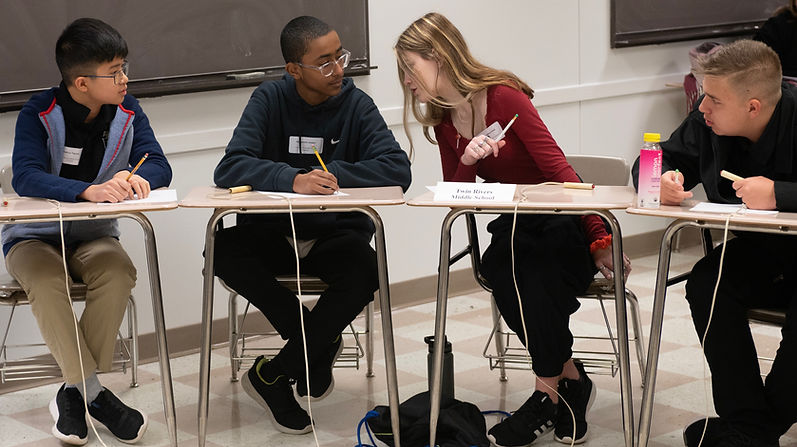One of the 2005 Coaches’ Survey questions was, “What important piece of information would you share with a new Academic Bowl coach?” Here are the unabridged answers:
Get copies of questions for practice.
Keep score at practice using PAGE sheet at least a few times so you are used to the format when you have to keep score at competition.
Train a parent or high schooler to time, read and score so that there are back-ups at competition if needed.
Practice, practice, practice.
Talk to everyone (coaches, teachers, principal, etc.) about the master schedule so you can work out schedule conflicts early – even as far as six months in advance!
If meeting after school, refreshments are great!
Communicate with parents – my parents constantly forgot the competition times despite letters and reminders.
There must be a grade qualification – otherwise, you may end up with students that become a distraction or who have trouble working with the speed of the game.
Understanding how the contest is set up with toss-up and bonus questions is very important to a new coach.
Understanding the wide range of knowledge that can be questioned is also important.
Assign an assistant coach.
Mingle with the other coaches before the matches.
Questions that contain some of the same words in the question as in the answer
I was new to Academic Bowl this year and I think practice is the key.
We met consistently for three months twice weekly. We also worked on students being aggressive and willing to answer questions.
The team practiced against themselves.
Start practicing in October and practice as if it’s a competition (with equipment).
Practice four-part bonus questions.
Order at least one set of PAGE Bowl questions before the competition and practice your strategy.
Quiz Bowl is a lot of fun for both students and coaches.
Parents get involved!
Quiz Bowl provides a positive competitive environment for academically talented students.
It is a time commitment!
In practice and in meets, keep statistics on individuals who answer correctly and incorrectly on toss-up questions in order to keep the strongest players active.
Remember that this is for the kids!!!!
Coaches don’t need to know the answers to everything.
Coaches must make sure that their students have good manners and be appreciative of all the people responsible (readers, etc.).
Be consistent with practices. Make it STATUS to make the team.
Practice weekly throughout the school year.
Each new Academic Bowl coach should be well acquainted with all rules and procedures of the competition.
Find out as much information as possible from organizers and other schools so that you will be adequately prepared.
Begin tryouts early in the school year. Communicate with the academic teachers. Try to have practice during the school day so all the team members can practice.
Try to set up practice rounds with other teams (we practiced against the high school team). They really need exposure to other competitions.
Choose members who have different strengths.
We always try to have at least a couple of 6th and 7th grade members even if they don’t get much playing time. The practice is invaluable.
Practice, practice, practice.
Begin your practices early – September.
Practice with old bowl questions primarily.
Start early!
Experience is what really helps our teams. We take a 5th grade team to the Chattahoochee High School Quiz Bowl for Middle Grades (in addition to two, sixth grade teams). Our PAGE team is made up of 6th graders who all have a lot more actual competition experience than most of the 7th and 8th graders we’re up against in the Regionals. (Ever wonder why Chamblee Middle is consistently good? That’s where most of our 6th graders go after they finish up at Kittredge.)
Study old questions!
Practice, practice, practice. We use previous years’ questions and study lists (capitals, authors, etc…) Participating in something like the Knowledgemaster Open (done on computer) is also helpful.
Practice more than once per week. Find someone experienced to help you with proper procedures.
Get packets of past questions for practice sessions.
Be brave about cutting disruptive kids. We were too kind our first year or two, letting everyone interested stay on the team. We lost lots of practice time with kids who just had to comment or argue over every little thing, or wanted to cut up. This was a disservice to kids who really wanted to be competitive. This was the hardest thing for us to do.
Emphasize conduct. Keeping kind, cooperating, not getting misdirected by anger or self-recriminations when an answer is wrong, keeping focused. Being polite to each other, to other teams, and to the judges at all times, even when you feel the judge makes a wrong call, which happens from time to time.
Practice, practice, practice.
Don’t sweat the big stuff – have fun, allow your students to see you model integrity and grace. Whether you win or lose, win AND lose as a TEAM.
I have had students with very average grades who shine in this competition because they are well read or have traveled greatly.
Learn the rules, scoring, timing and procedures of the game and competitions.
Make sure you work on teamwork and relationship building between students. That way, win or lose, it’s a good experience.
Practice, practice, practice.
If you have any other tips you would like to share, please email them to us at academicbowl@pageinc.org.

